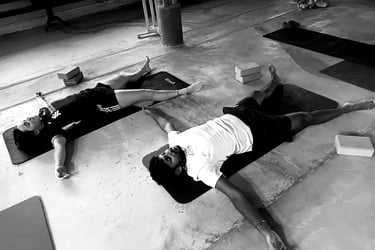Yoga & Weight Loss
Hormonal Balance
The aim isn’t really to lose (belly) fat - it’s to restore hormonal balance. When cortisol, insulin, and appetite hormones are in check, belly fat becomes easier to shift. If balance is there, fat loss is a bonus; if it isn’t, fat loss is a battle.
That’s why the typical “eat less, move more” advice often fails - it ignores stress, sleep, and powerful hormonal signals. Worse still, if you only count workout hours or calories cut and then measure your waistline, you’re chasing the lag indicators. Fat loss is slow to show, and measuring only that will almost guarantee frustration and confusion.
What matters more are the lead indicators: deeper sleep, steadier energy, calmer mood, and consistent movement. These are the real signs of progress - the things that cause change. Waistline and weight are simply the delayed results. Those who practise yoga will recognise this: the lead indicators are the ones that tend to show up first. Better sleep, a steadier nervous system, calmer moods, and more consistent energy often come long before any physical change.
Gut Health
That’s why we often ask new students: What do you do for work, and how much sleep are you getting?
Office worker? High likelihood of prolonged sitting, mental stress, and convenience eating.
Sleeping less than 7 hours? Very likely you’re dealing with high cortisol, disrupted hunger signals, and impaired insulin sensitivity.
Losing belly fat is not just about cutting calories, carbs, or going to the gym. If there’s a first target, it’s reducing stress enough to get consistent, quality sleep. That’s especially true for men over 30, where belly fat is strongly tied to cortisol and disrupted hormones.
But it’s not just men. Women experience the same stress–sleep–hormone loop, though it often shows up differently - think stubborn waist, hip, or thigh fat. The underlying principle is the same: stress and poor sleep drive hormonal imbalance, and fat storage follows.
Endnote:
When you’re stuck in survival mode, your nervous system’s only priority is to protect you from perceived threats - like stress from work, poor sleep, or a restrictive diet. In this state, a tough workout isn’t read as a cue to get lean; it’s simply another threat. The body responds by holding onto fat and resisting change. That’s not failure, it’s physiology. Your nervous system is just doing its job.




More Insights
